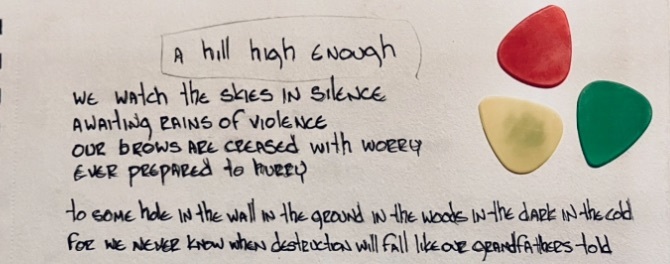A continuation of my last post, Seven Minutes That Justify My Existence. (You can find the next post here).
As the title suggests, this piece is much more contemplative (i.e. “boring”) than the last one. But the next post should be more interesting.
Seven Minutes for Reflection
“Justifying” Existence
I gave that last piece a catchy title, but in no way did my actions “justify” my existence. Existence is a fact. It is not a privilege, or a right, contingent upon “justification.” I had not “justified” my existence. I had merely:
- enjoyed the profound good fortune
- to share an experience
- that furnished the sensation
– that my existence had been “justified.”
Apart from the birth of my daughter, it had been the most impactful moment of my life. Two human beings were incredibly fortunate that evening.
Aftermath
I departed the scene immediately upon learning that the car had contained no passengers. My work was complete. Lingering around for accolades would only contribute to the traffic hazard.
I wondered about the fire burning up the pine tree and into the eucalyptus. Would the fire department be able to contain it before it spread? It hadn’t even arrived on scene by the time I left.
When I arrived home I texted my sales manager, who lived close to the accident site on the same side of the freeway. I asked if the fire had grown, but she hadn’t even heard there was a fire. (Obviously it had been contained). I sent some photos from the scene and told her what had happened. And I let her know that smoke inhalation was causing me some respiratory distress. (If it worsened and my Covid symptoms return, I wanted her to have some context should I need more time off).
I didn’t share the story with others at the office. I was curious to see if my boss would. But she never brought it up to me afterward, nor did anyone else from work. Later, during casual conversations with coworkers about that notoriously dangerous stretch of road, I would reference other, minor emergencies I had helped to resolve –

– and the tool kit I had begun to carry in my trunk (heavy crowbar, high-quality first aid kit with trauma gear, emergency smoke evacuation masks, etc.) I asked if anyone had heard about the car fire. None had.
Seven Minutes for Reflection
That realization was disappointing. While my manager assiduously orchestrated a minor spectacle upon every sale, the topic of a member of her team saving someone from burning to death didn’t even merit a casual mention to a coworker.
I felt incredibly fortunate for my experience. And in principle I believe that this should constitute its own reward. But on a personal level I did desire some kind of recognition from my peers. While I might be an unremarkable salesperson, I thought I had just scored a big win as a human being!
(And I acknowledge that this internal conflict between what I thought I ought to feel and what I did feel caused some purely personal discomfort).
But the whole experience was discouraging on a deeper level as well. It felt emblematic of the trend in society towards prioritizing wealth generation over everything else that makes us human. It’s something I see everywhere, all around me. (You don’t have to look much further than the current Boeing debacle to realize that we are deeply infected by this sickness).
And, it was the debut of the latest and most horrifying iteration of this crisis that gave me the final push into the despair that broke me last year.
Seven Minutes for Reflection
Janteloven
In the epilogue to my last piece I noted that it was a challenging one for me to publish. But why should it be? It’s a gripping and inspiring true adventure story! I’ve had some wild experiences, but this was hands-down the most incredible and intense. So why not tell it?
I hesitate to share the story because it feels like I am seeking admiration or acclaim. While it’s one thing to demonstrate excellence, it’s another thing entirely to publicize it. And while I desired some recognition for my action, I didn’t want to ask for it. I didn’t believe that I should have to.
I’ve only just recently stumbled on the concept of “Janteloven,” or “The Laws of Jante.” These are a satirical set of behavioral laws (conceived by author Aksel Sandemose) to “formulate social norms that had stamped the Danish and Norwegian psyches for centuries.”
The essence of Janteloven is this. Scandinavian culture contains unwritten rules prohibiting all expressions of arrogance or boastfulness, or any claims to superiority or higher status.
What an enlightening discovery! I come from Danish farmer stock on my father’s side. And I can tell you that I certainly wasn’t raised to self-promote. In fact, I was specifically trained NOT to. I remember my father instructing me as a child not to speak highly of myself. It was for others to speak highly of me (should it ever be warranted). Likewise, it was for me to speak highly of others when merited. This wasn’t just a didactic exercise, my father lived that lesson by example.
So that’s what I do. When I see excellence in others, I do whatever I can to promote them and highlight that excellence. But how could I do that for myself? It is not my place to do so!
Seven Minutes for Reflection
What’s the Difference Between Cultural Criticism and Personal Complaint?
Instilled with these Danish morals, I’m ill-suited to an American culture that dominates the global field in boastfulness and self-aggrandizement. I feel profound aversion when I witness such expressions in others.1 Meanwhile, any act of serious self-promotion on my own part makes me very uncomfortable. I have to force myself to promote my own artistic work. I manage best if I can come up with a clownish, self-deprecating way to do it.
A society tolerant of self-promotion can allow individuals to attain high status by virtue of unjustified confidence and empty words. Modesty, however, is a liability. It can ensure that that your hard work fails to lift you very far from the bottom of the pile. I believe such a culture empowers humans who are more destructive, and creates a society that is more malignant, than one that discourages such behaviour.
[I submit as evidence the Strange Case of Donald Trump – although I suppose any other national politician should provide an equally persuasive, if less flagrant, example. While on the other side, I am sure you can furnish your own list of admirable, modest, hard-working people who have little to show for their efforts].
So there’s your “cultural criticism” for you.
But there’s more on this page than mere reflection. I have to acknowledge my resentment towards our culture; I am pinning some of my own failure to thrive to its chest as evidence of its shame. But resentful criticism is equivalent to personal complaint, and I’m not wild about complaining either.
Seven Minutes for Reflection
Now What?
I find myself pinioned in an uncomfortable place between two unsavory positions – self-promotion and complaining. I don’t want to spend a lot of time wallowing in that disempowering rut! The empowering escape likely involves a bit of compromise with one or the other (or both) of the two noxious alternatives, combined with some positive steps of action.
That is the subject of my next post – Seven Minutes Towards Action.
- A big contributor of my strong aversion to hip-hop music and culture. Also why I find Donald Trump wholly insufferable. ↩︎



